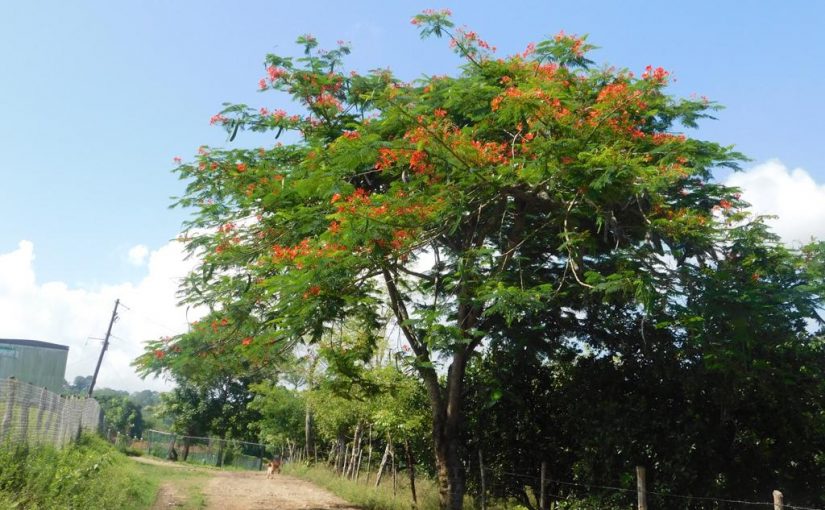In this lesson we will learn the imperfect tense, which describes an action or state in the past but without a termination limit. In other words, it’s a past action in process or which used to occur. In Huasteca Nahuatl, the imperfect tense is marked by adding the suffix /-yaya/ to the verbal base before the number marker, which is “ø” for the singular and “-h” for the plural. See the following examples:
Nipano “I pass”
Nipanqui “I passed”
Nipanoyaya “I was passing”
As we have seen, there are four verb classes. The imperfect changes verb stems in class three: Those ending in /-ia/ and /-oa/, lose their final /a/ in the imperfect.
Ahahuiltiliztli tlen tlachihualiztli (Conjugation of the verb)
ni – (verbal base) – yaya – ø
ti – (verbal base) – yaya – ø
ø – (verbal base) – yaya – ø
ti – (verbal base) – yaya – h
in – (verbal base) – yaya – h
ø – (verbal base) – yaya – h
Tlachihualiztli tlen clase ce (Verbs in class one)
/itta/ “to see”
Niquittayaya “I was seeing” (something)
Tiquittayaya “You were seeing” (something)
Quiittayaya “She/he was seeing” (something)
Tiquittayayah “We were seeing” (something)
Inquiittayayah “You (plural) were seeing” (something)
Quiittayayah “They were seeing” (something)
/ōni/ “to drink”
Nicōniyaya “I was drinking” (something)
Ticōniyaya “You were drinking” (something)
Quiōniyaya “She/he was drinking” (something)
Ticōniyayah “We were drinking” (something)
Inquiōniyayah “You (plural) were drinking” (something)
Quiōniyayah “They were drinking” (something)
/pano/ “to pass”
Nipanoyaya “I was passing”
Tipanoyaya “You were passing”
Panoyaya “She/he was passing”
Tipanoyayah “We were passing”
Inpanoyayah “You (plural) were passing”
Panoyayah “They were passing”
Tlachīhualiztli tlen clase ōme (Verbs in class two)
/cāhua/ “to leave”
Niccāhuayaya “I was leaving” (something)
Ticcāhuyaya “You were leaving” (something)
Quicāhuyaya “She/he was leaving” (something)
Ticcāhuyayah “We were leaving” (something)
Inquicāhuyayah “You (plural) were leaving” (something)
Quicāhuyayah “They were leaving” (something)
/āmati/ “to like”
Nicāmatiyaya “I used to like” (something)
Ticāmatiyaya “You used to like” (something)
Quiāmatiyaya “She/he used to like” (something)
Ticāmatiyayah “We used to like” (something)
Inquiāmatiyayah “You (plural) used to like” (something)
Quiāmatiyayah “They used to like” (something)
/āmiqui/ “to be thirsty”
Niāmiquiyaya “I was thirsty”
Tiāmiquiyaya “You were thirsty”
Āmiquiyaya “She/he was thirsty”
Tiāmiquiyayah “We were thirsty”
Ināmiquiyayah “You (plural) were thirsty”
Āmiquiyayah “They were thirsty”
Tlachīhualiztli tlen clase ēyi (Verbs in class three)
/poloa/ “to lose”
Nicpoloyaya “I was losing” (something)
Ticpoloyaya “You were losing” (something)
Quipoloyaya “She/he was losing” (something)
Ticpoloyayah “We were losing” (something)
Inquipoloyayah “You (plural) were losing” (something)
Quipoloyayah “They were loosing” (something)
/illia/ “to say”
Niquilliyaya “I was saying” (to someone)
Tiquilliyaya “You were saying” (to someone)
Quilliyaya “She/he was saying” (to someone)
Tiquilliyayah “We were saying” (to someone)
Inquiilliyayah “You (plural) were saying” (to someone)
Quilliyayah “They were saying” (to someone)
/motlaloa/ “to run”
Nimotlaloyaya “I was running”
Timotlaloyaya “You were running”
Motlaloyaya “She/he was running”
Timotlaloyayah “We were running”
Inmotlaloyayah “You (plural) were running”
Motlaloyayah “They were running”
Tlachįhualiztli tlen clase nahui (Verbs in class four)
/cuā/ “to eat”
Niccuāyaya “I was eating” (something)
Ticcuāyaya “You were eating” (something)
Quicuāyaya “She/he was eating” (something)
Ticcuāyayah “We were eating” (something)
Inquicuāyayah “You (plural) were eating” (something)
Quicuāyayah “They were eating” (something)
/mama/ “to carry”
Nicmāmāyaya “I was carrying” (something/someone)
Ticmāmāyaya “You were carrying” (something/someone)
Quimāmāyaya “She/he was carrying” (something/someone)
Ticmāmāyayah “We were carrying” (something/someone)
Inquimāmāyayah “You (plural) were carrying” (something/someone)
Quimāmāyayah “They were carrying” (something/someone)
/pa/ “to paint”
Nicpayaya “I was painting” (something)
Ticpayaya “You were painting” (something)
Quipayaya “She/he was painting” (something)
Ticpayayah “We were painting” (something)
Inquipayayah “You (plural) were painting” (something)
Quipayayah “They were painting” (something)
Tequitl cē (Activity One): Conjugate four verbs in different classes in the imperfect tense.
Tequitl ōme (Activity Two): Write four sentences with the verbs from work one in the imperfect tense. For example:
Laura axcanah quicuāyaya nacatl zampampa naman tlahuel quiāmati.
Laura does not eat meat, but now she likes it a lot
Nototatah huahcauhquiya tlahuel tlaōniyaya naman ayoc cānah quiāmati.
My dad used to drink a lot some time ago, now he does not like it.
Tequitl ēyi (Activity Three): Write a paragraph describing “what you used to like.”

